Tag Archives: North American Right Whale
Following Legal Victory for Maine Lobstermen’s Association, State Receives $17 Million from NOAA to Improve Data on Right Whale
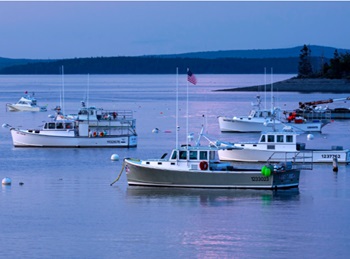 This federal funding comes just months after the federal court of appeals ruled in favor of the Maine Lobstermen’s Association (MLA) in their lawsuit against the National Marine Fisheries Service (NMFS) — a subagency of NOAA — for adopting improperly-founded regulations against the industry. In September of 2021, the MLA filed a lawsuit against the agency alleging that their efforts to protect the NARW were unlawful, as the regulations promulgated were founded upon a “simplistic and false premise” that “exaggerates and arbitrarily inflates the risk posed by the Maine lobster fishery.” The MLA stated that the NOAA’s analyses was “unlawful” as they “did not rely on the best available scientific information, made erroneous and arbitrary assumptions unsupported and contradicted by data and evidence, relied on an outdated and flawed methodology to model projections of the North Atlantic right whale population, and inexplicably failed to account for either the positive impact of mitigation measures already or soon-to-be employed by the Maine lobster fishery.” more, >>click to read<< 07:09
This federal funding comes just months after the federal court of appeals ruled in favor of the Maine Lobstermen’s Association (MLA) in their lawsuit against the National Marine Fisheries Service (NMFS) — a subagency of NOAA — for adopting improperly-founded regulations against the industry. In September of 2021, the MLA filed a lawsuit against the agency alleging that their efforts to protect the NARW were unlawful, as the regulations promulgated were founded upon a “simplistic and false premise” that “exaggerates and arbitrarily inflates the risk posed by the Maine lobster fishery.” The MLA stated that the NOAA’s analyses was “unlawful” as they “did not rely on the best available scientific information, made erroneous and arbitrary assumptions unsupported and contradicted by data and evidence, relied on an outdated and flawed methodology to model projections of the North Atlantic right whale population, and inexplicably failed to account for either the positive impact of mitigation measures already or soon-to-be employed by the Maine lobster fishery.” more, >>click to read<< 07:09

Energy industry uses whale activists to aid anti-wind farm strategy, experts say
One night in late March, J Timmons Roberts, a professor of environmental studies at Brown University, stepped in to a high school gymnasium in a small seaside town in Rhode Island. He was there to speak at a town hall aimed at allaying concerns about a local offshore windfarm. In the front row, he noticed a woman dressed as a whale, holding a sign that read “Save Me!” The woman in the front row was Mary Chalke, co-founder of the Save Right Whales Coalition (SRWC), a group of organizations across the east coast that oppose offshore wind projects, arguing they pose an existential risk to the endangered North American right whale. That night at the town hall, Roberts also spotted Elizabeth Knight, who founded Green Oceans earlier this year, another anti-wind organization in Rhode Island. Roberts said he felt compassion for Knight. “She thinks a train wreck is coming,” said Roberts. >click to read< 10:17
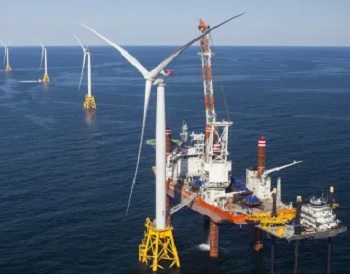
4 lawsuits threaten Vineyard Wind
The lawsuits against America’s first major offshore wind project are coming to a head. Four cases are challenging the federal environmental permit issued to Vineyard Wind, a 62-turbine facility being planned for construction in the waters off Martha’s Vineyard. A federal judge in Massachusetts heard arguments brought by landowners in two cases in recent weeks. The other two suits, brought by fishing groups, have been consolidated and will appear before the same judge for oral arguments in Boston on Monday. The cases against Vineyard Wind allege that the Bureau of Ocean Energy Management conducted an inadequate environmental review when it approved the project by failing to account for its impact on everything from fishermen to the critically endangered North American right whale. >click to read< 07:32
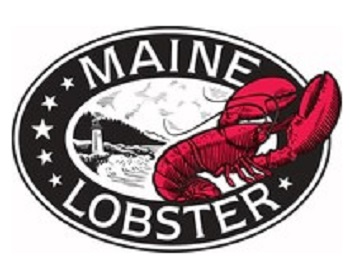
Ongoing Legal Battles Put Maine Lobster Fishery in Crosshairs, Results in Suspension of Marine Stewardship Council Certification
An ongoing legal dispute between environmental activists and the federal government has led Maine Lobster’s Marine Stewardship Council (MSC) fishing certification to be suspended. An independent auditor conducted a comprehensive evaluation of the fishery earlier this year and determined that Maine Lobster is a well-managed and sustainable fishery according to MSC fisheries standards. Shortly after this assessment, a court ruled that regulations issued by the National Marine Fisheries Service to govern the management of North American right whales (NARW) do not meet the requirements of federal laws to protect endangered species. As a result of this court ruling, while the industry has complied with all regulations in good faith, the independent auditor suspended the MSC certificate of the fishery. >click to read< 18:02

Lobster harvesters worry about survival of their livelihoods
The state’s lobster industry is bracing as federal regulators consider additional requirements they claim are needed to protect the endangered North American right whale, proposals many fear could spell doom for the industry and the coastal communities that it supports. Squaring off in this battle are national environmental and animal rights organizations versus Maine and its lobster harvesters. The legal war began in January 2018 when the Center for Biological Diversity, the Defenders of Wildlife, the Humane Society of the United States, and the Conservation Law Foundation filed a lawsuit in the U.S. District Court of D.C. against the U.S. Department of Commerce and the NOAA. The environmental and animal rights groups claimed the federal agencies had not done enough to protect the North Atlantic right whale from lobster harvesting. >click to read< 12:42
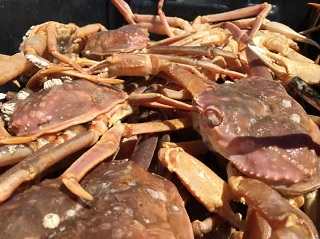
Russian snow crab weighs down our markets
The snow crab fishing season in the southern Gulf of St. Lawrence this year was weighed down by the arrival on the American market of large quantities of this crustacean from Russia. This Russian crab was imported in abundance amid shortages last fall, due to the closure of the fishery in Alaska, and when household spending was on the rise. However, what was selling at a high price then continued to lose its value during the winter, when the American and Canadian governments ended the aid programs linked to the pandemic and when consumers finally deconfined recovered. to travel rather than eat expensive crab at home. Additionally, US buyers continued to buy Russian crab in droves this spring, rather than Canadian crab, before it was affected by the trade embargo due to the war in Ukraine. >click to read< 8:44
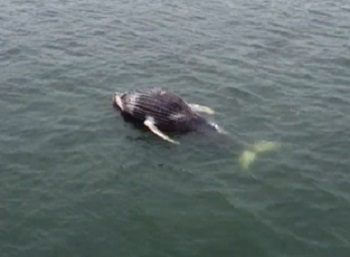
Boaters clobber rare Right whale and calf, but they avoid legal consequences
There’s nothing like a good shipwreck story. The crash happened near dusk on Feb. 12, 2021. A captain and seven passengers were aboard the 54-footer. They were returning from a day of competing at the Northeast Florida Wahoo Shootout. The boat was doing about 21 knots, 24 mph if you’re a landlubber, as it headed for the Conch House Marina in St. Augustine. Nearing their destination, in the St. Augustine Inlet, the boat smacked into something — hard. The boat stopped dead in the water. So did whatever it had hit. Suddenly the “About Time” didn’t have much time. Both its twin engines shut down and the damaged boat began sinking fast. When a pair of Florida wildlife officers showed up, the owner of the boat, Dayne Williams of New Smyrna Beach, blurted out, “I think we hit a whale. I saw fins and blood.” Biologists immediately identified it as an endangered North American right whale. >click to read< 12:34
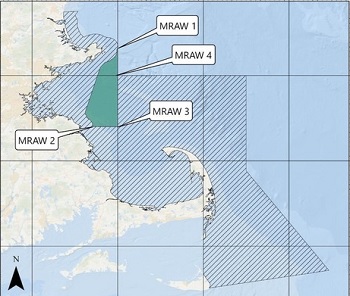
Feds institute ’emergency’ lobster closure to protect right whales
The federal government will close an additional 200 square miles off the coast of Massachusetts to lobster and Jonah crab fishing in April to protect endangered right whales. The National Oceanographic and Atmospheric Administration (NOAA) is closing the area on an “emergency” basis, without taking public comment, a move that frustrates lobstermen already contending with extensive fishing restrictions. >click to read<
Emergency Closure for Lobster and Jonah CrabTrap/Pot Fishery: Area Between Massachusetts Restricted Area and Massachusetts Restricted Area North for April 2022 – Lobster and Jonah crab trap/pot fishermen fishing in the federal waters between the Massachusetts Restricted Area North and the Massachusetts Restricted Area must remove all trap/pot gear from this area, and may not reset trawls being actively fished, or set new trawls in this area for the period from April 1-30, 2022. >click to read< 12:02
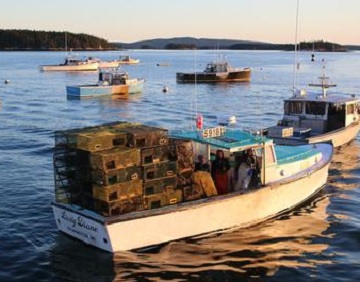
NOAA orders lobster fishing gear out of offshore zone
After a month-long court battle, an appeals court upheld the closure on November 16 U.S. Rep. Jared Golden, a Maine Democrat, said that the annual closure from October 1 to January 31 sets a dangerous precedent. It “will give federal agencies a green light to pursue regulatory actions that could devastate communities without any regard for whether or not those efforts are grounded in facts and data,” he said in a statement. “It’s regulations like this one that make people distrust government. Instead of looking out for hardworking people, our government cares more about appeasing deep-pocketed environmental groups that can litigate our lobster fishery out of existence,” Golden said. >click to read< 09:19
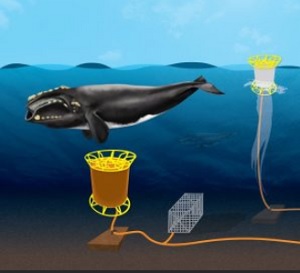
Fed Right whale plan could mean lobster industry changes – a reinvention of the fishery as we know it
Federal officials recently released plans,,, But it’s the risk reduction target, an aggressive 98 percent, that Maine Department of Marine Resources officials said means only one thing, “a complete reinvention of the fishery as we know it.” The conservation framework, an addition to the 582-page biological opinion, creates a four-phased approach to all but eliminate the death and serious injury of the whales in federally managed fishing grounds. The first phase calls for a 60 percent reduction in right whale deaths and serious injuries this year. Patrice McCarron, Maine Lobstermen’s Association, fears the industry can’t sustain that level of change. “If you look at the changes we’ve made over the last 25 years, there’s not a lot left to give,”, >click to read< 10:27
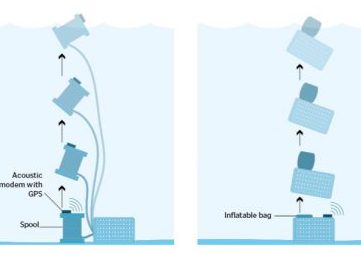
Enviros and lobster fishermen are unhappy with proposed federal regulations to protect right whales
In a public hearing Tuesday night, conservationists and fishermen alike roundly criticized federal regulators’ proposed changes in fishing rules to protect endangered whales from fishing gear. Much of the discussion focused on so-called ropeless lobster fishing technology, which allows traps to be located and retrieved using remote-control systems. Conservationists see that as the ultimate solution, But many Maine fishermen scoff at the idea, and Marine Resources Commissioner Patrick Keliher agreed it’s not practical for Maine’s diverse fishing grounds. >click to read< 15:33

































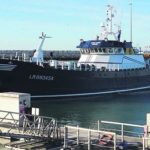
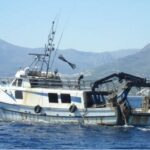
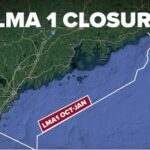
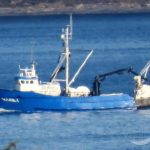
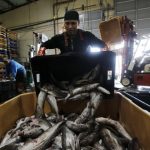
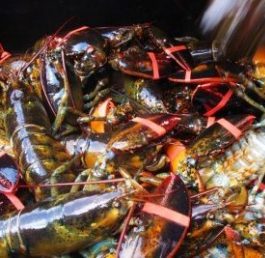




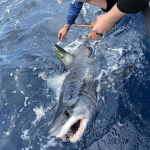



Stevenson: It’s time for public comments on offshore wind
Share this post